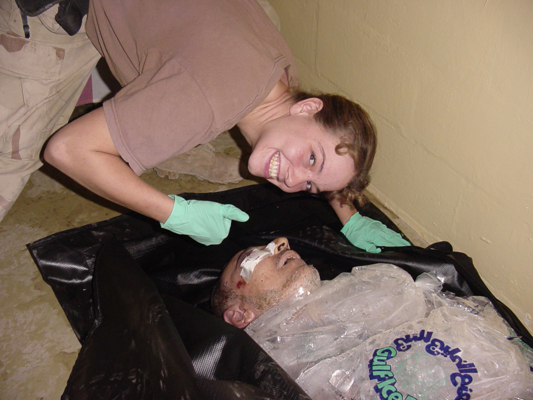Errol Morris, an American director, directs a short documentary "Harvesting me" and a film "Standard Operating Procedure". At a glance, these documentaries seemed unrelated. However, they share common aspects, surveillance and its effect on people. Harvesting me is about Josh Harris, who decided to live in public. He put up cameras around his house and broadcast it to the world. Disturbing as it was, people actually paid to watch him. In fact, he earned a lot of money doing it. On the other hand, Standard Operating Procedure deals with issue in Abu Ghraib where photographs of prisoners were leaked. These photographs portrays the mistreatment of the prisoners there. The film investigated the possibilities of what could have happened in the moment the pictures were taken. Many of the participants in the picture were interviewed.
 |
| The picture portrays a dead body of a prisoner and a US military smiling with a thumb up |
Even though, Sabrina's excuse seem a bit shallow, there is still some truth in the picture (pun intended). We "perform" in front of camera. We act differently knowing someone is watching. This might say something about us as a whole. Is the person you know through the looking glass, the same person when s/he alone?
Beware of the photos...
I think your thoughts are really important. The camera lens became a means to and end for all of these individuals, and the moments that were captured changed their lives- all in a negative way. I guess to further this question or statement you pose is to wonder whether the camera is acting as a negative medium, and what is it making us do?
ReplyDeleteI like what Emily says about the camera lens becoming a means to an end. However, I feel as though your argument would have been made stronger if you examined the idea that regardless of what may have happened out the photograph, the photo still provides some indisputable truth or documentation of that particular moment in time, and the fact that photos are used in today's law enforcement systems as proof for various cases also shows that photos can be used as a viable source of documentation. (Which incidentally was Sabrina's intention when taking pictures at Abu Ghraib).
ReplyDelete